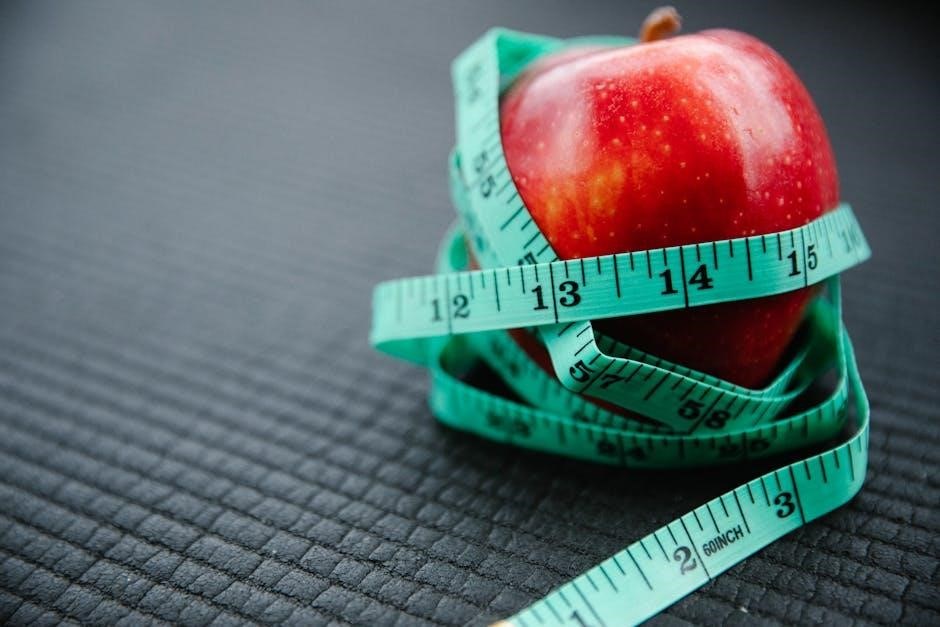
diet plan for breastfeeding mothers to lose weight pdf
A well-structured diet plan supports milk production and aids in weight loss for breastfeeding mothers․ It focuses on nutrient-rich foods, hydration, and avoids unhealthy options for a healthy postpartum journey․
Importance of a Balanced Diet for Milk Production and Weight Loss
A balanced diet is crucial for breastfeeding mothers to support milk production and promote healthy weight loss․ It ensures adequate nutrition for both mother and baby, maintaining energy levels and overall health․ A diet rich in nutrients, whole foods, and proper hydration helps sustain milk supply while aiding in gradual weight loss․ Avoiding high-sugar and high-fat foods is essential to prevent excessive calorie intake․ Prioritizing nutrient-dense meals supports metabolism and helps achieve a healthy postpartum weight safely and effectively․
Caloric Intake and Hydration Needs
Breastfeeding mothers need adequate calories and hydration to support milk production and weight loss․ Proper intake ensures energy levels and overall health for both mother and baby․
Minimum Daily Caloric Requirements for Breastfeeding Mothers
Breastfeeding mothers typically require 1,800 to 2,200 calories daily to support milk production and energy needs․ Consuming fewer than 1,500 calories may negatively impact milk supply, while exceeding requirements can hinder weight loss․ A gradual weight loss of 0․5 kg per week is recommended for a healthy postpartum journey․ Balancing calorie intake ensures both mother and baby receive adequate nutrition without compromising weight loss goals․
Role of Hydration in Milk Supply and Weight Management
Hydration is crucial for breastfeeding mothers, as it directly supports milk production and aids in weight management․ Drinking at least 8-10 glasses of water daily helps maintain milk supply and prevents dehydration․ Proper hydration also boosts metabolism, supporting gradual weight loss․ Additionally, staying hydrated can reduce hunger and improve digestion, making it easier to stick to a healthy diet plan․ Prioritizing water intake ensures both mother and baby thrive during the breastfeeding period․

Nutrient-Rich Foods for Optimal Health
A breastfeeding diet should include a variety of whole foods, such as fruits, vegetables, lean proteins, and whole grains, to ensure proper nutrition for both mother and baby․
Protein Sources: Lean Meats, Fish, and Plant-Based Options
Include lean meats like chicken, turkey, and lean beef, as well as fish rich in omega-3 fatty acids, such as salmon and sardines․ Plant-based options like beans, lentils, and tofu are excellent alternatives․ Dairy products and eggs also provide high-quality protein․ Nuts and seeds, such as almonds and chia seeds, are nutritious additions․ A balanced mix of these protein sources supports milk production and helps maintain muscle mass while promoting gradual weight loss․ Aim for 2-3 servings daily to meet nutritional needs․
Whole Grains and Fiber-Rich Foods for Sustained Energy
Whole grains like oats, quinoa, and brown rice provide sustained energy and essential nutrients․ Fiber-rich foods, such as fruits, vegetables, and legumes, aid digestion and keep you full longer․ Incorporate whole grain cereals, leafy greens, and berries into meals․ These foods support steady energy levels, promoting a balanced diet for breastfeeding mothers․ Aim for 5-7 servings daily to maintain energy and support overall health without excess calorie intake․
Fruits and Vegetables: Vital for Vitamins and Minerals
Fruits and vegetables are essential for providing vitamins, minerals, and antioxidants․ Aim for at least five portions daily, including a variety of colors․ Berries, citrus fruits, and leafy greens are rich in vitamin C and folate, supporting milk production and immune function․ Dark green vegetables like spinach and broccoli offer iron and calcium, crucial for both mother and baby․ Include bananas for potassium and oranges for vitamin C to ensure a nutrient-rich diet that supports overall health and energy levels while breastfeeding․
Healthy Fats: Nuts, Seeds, and Avocados
Healthy fats are crucial for energy, brain function, and hormone balance․ Nuts and seeds, like flaxseeds, chia seeds, almonds, and walnuts, are rich in omega-3s and fiber․ Avocados provide monounsaturated fats, vitamins, and minerals․ These foods support milk production and baby’s brain development․ Incorporate them in moderation due to their calorie density․ A handful of nuts or half an avocado daily can enhance your diet’s nutritional profile while aiding in weight management and overall health for both mother and baby․ They also keep you fuller longer, reducing unhealthy snacking urges․

Foods and Diets to Avoid
High-sugar and high-fat foods can hinder weight loss and may affect milk quality․ Avoid low-carb diets, as they can reduce milk supply․ Opt for balanced, nutrient-rich choices․
Limiting High-Sugar and High-Fat Foods
High-sugar and high-fat foods can hinder weight loss and may negatively impact milk quality․ These foods often lack essential nutrients and can lead to energy fluctuations․ Breastfeeding mothers should opt for nutrient-dense alternatives like fruits, vegetables, and whole grains instead of processed snacks․ Reducing sugary drinks and fried foods helps maintain a healthy calorie balance․ Prioritizing wholesome meals supports milk production and promotes gradual, sustainable weight loss without compromising maternal or infant health․
Why Low-Carb Diets May Not Be Suitable
Low-carb diets can negatively impact milk supply and energy levels in breastfeeding mothers․ Carbohydrates are essential for producing lactose, a key component of breast milk․ Severely restricting carbs may lead to nutrient deficiencies and fatigue․ Additionally, low-carb diets can be challenging to maintain long-term and may not provide the balanced nutrition needed for both mother and baby․ A moderate approach that includes whole grains, fruits, and vegetables is generally more sustainable and beneficial for overall health and milk production․
Safe Exercise Routines for Weight Loss
Gentle exercises like walking, swimming, and yoga are ideal for postpartum weight loss․ They support physical recovery and promote gradual weight loss without harming milk production or energy levels․
Postpartum-Friendly Exercises: Walking, Swimming, and Yoga
Walking, swimming, and yoga are excellent postpartum exercises that promote gentle weight loss and overall well-being․ Walking boosts cardiovascular health without strain, while swimming provides a low-impact, full-body workout․ Yoga enhances flexibility and reduces stress, benefiting both physical and mental recovery․ These activities are easy to incorporate into a busy schedule and support a mother’s return to fitness post-birth․ They also help maintain energy levels needed for breastfeeding and caring for a newborn․ Consistency is key for gradual, sustainable weight loss․

Monitoring Progress Effectively
Track weight and measurements weekly, focusing on gradual changes․ Avoid obsessive monitoring to maintain a balanced mindset and ensure sustainable weight loss while supporting milk supply and overall health․
Tracking Weight and Measurements Without Obsession
Tracking weight and measurements weekly helps monitor progress without obsession․ Aim for gradual weight loss of 0․5 kg per week to shed pounds sustainably․ Combine a balanced diet with regular hydration and moderate exercise, such as walking or swimming․ Avoid high-sugar and high-fat foods to support health․ Stay committed with loved ones’ support to maintain a healthy postpartum routine effectively, ensuring patience and consistency in your journey․

Tips for Maintaining a Balanced Lifestyle
Meal prepping saves time, while prioritizing sleep aids weight loss and milk production․ Stay hydrated, eat nutrient-dense meals, and manage time effectively for a balanced postpartum routine․
Meal Prepping and Time Management Strategies
Meal prepping is a game-changer for breastfeeding mothers, ensuring healthy meals are ready in minutes․ Dedicate one day a week to prepare nutrient-rich meals and snacks, storing them in reusable containers․ Plan your meals around your schedule to avoid last-minute fast food․ Simple, one-pot recipes and batch cooking can save time․ Involve family members in meal prep to share the load․ Stay consistent with your plan to maintain energy levels and support both weight loss and milk production without added stress․
Importance of Sleep for Weight Loss and Milk Production
Sleep plays a crucial role in both weight loss and milk production for breastfeeding mothers․ Lack of sleep disrupts hormones that regulate hunger and metabolism, potentially hindering weight loss efforts․ Additionally, poor sleep quality can negatively impact milk supply․ Prioritize 7-9 hours of quality sleep nightly to support metabolic health and lactation․ Establish a bedtime routine and create a restful environment to improve sleep quality, ensuring better overall health and vitality for both mother and baby․
A balanced diet, proper hydration, and gradual weight loss strategies support breastfeeding mothers in achieving their goals while maintaining milk production and overall health․
Patient and Gradual Approach to Weight Loss While Breastfeeding
Aiming for a gradual weight loss of 0․5 kg per week is safe and supports milk production․ Focus on nutrient-dense foods, staying hydrated, and avoiding extreme diets․ Prioritize whole foods, lean proteins, and fiber-rich options while maintaining a caloric intake of at least 1,800 calories daily․ Avoid low-carb diets and high-sugar foods to ensure balanced nutrition․ A steady approach ensures long-term success without compromising milk supply or overall health․
Leave a Reply
You must be logged in to post a comment.